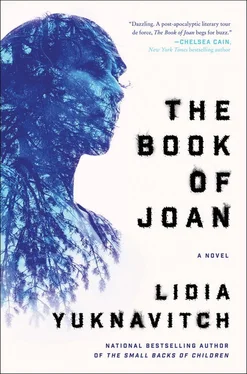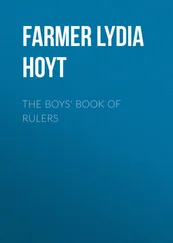As Leone witnessed the transformation of the girl whose side she never left again, she became attracted to Joan the way magnets are, irreducibly linked to this girl and her body and her ungodly nature. Her flux and glare.
One day, during a lull in the combat, a boy who must have been around fourteen challenged Joan to a fistfight. They’d been living in a Russian forest for most of the summer, an entire child garrison, and were no doubt about to be repositioned to France or England or maybe even California for the fall; children did not fare well in Russian winters. The boy was a simple bully, the type who maintained his power and status through random acts of false bravado. He spit in Joan’s face and held up his fists.
Joan didn’t even raise her arms. She closed her eyes. The boy adopted a boxer’s stance, his feet far apart. But then the ground shook, and at his stupid feet the earth zigzagged and opened up a little, and before anyone could figure out what was happening an alder tree shot up out of the ground with him buried in its crown and didn’t stop until it was grown and he was high up in the sky, squawking like a bird. It was funny, but it was more frightening than it was funny, so there was dead silence.
When finally the boy climbed down, another unexpected thing happened. Instead of crying or lashing out, the boy grabbed Joan’s hand and brought her straight to his father a forest away, a general in command of the most important battalion in the northern hemisphere, and narrated what she’d done. The general then spoke to Joan alone.
For three days.
For three days she told her story, because—unlike her agonized mother or the endless stream of doctors or concerned counselors—this military man listened without saying anything, or judging her, or calling her crazy. At times, it was said, a song radiated out from the room they were in. In that time, a question was born in her—a question he asked her point-blank, alone in a room, at the zenith of the Wars:
“Girl.” A look in his eyes so desperate as to be nameless. “Can you stop this brutal bloodstory?”
Iwake in my cell wet with sweat, in the limbo of my incarceration, and linger in the memory of reading my graftstory. To fall asleep reading—it feels nostalgically human and earthbound, even in this too-black night of space. Then I realize I’m not wet with anything. I just remember sweat. Long for it.
I’ve had the recurring dream. Again the dream of the sun, the birth of our ending, flickered behind my lids like skull cinema. In the dream, it happens exactly as it did in life, only faster and in retinal flashes. The way dreams distill time and displace images. I am not exactly an actor in the dream scene; I’m more of an observer—or, perhaps more accurate, a scribe. As events play out in my dream, I can see myself grafting the story directly onto my body. It’s as if I am history writing itself. And this: I have hair. Long luxurious cascades of blond hair curling down my arms and back like wood shavings, blowing in the wind and across my face. Mythic. And completely ludicrous.
But my dream has evolved over time. The scene is constructed from shards of a different memory: a memory of a film I saw in childhood. In the film, a Russian man, a doctor of the peasant class, bobbles his way through history as a powerless widget, serving this or that tyrant, this or that historical revolution or resistance, sometimes by accident, rarely by design. Sometimes he is briefly part of a heroic moment, other times he is unfairly incarcerated or punished; there is no cause-and-effect relationship between his own life and the larger story. The doctor loves two women. One is his wife, who comes by him in the natural order of things in their country. The other is a woman who is out of reach by class and beauty and even logic, but like all tragic lovers, they are driven madly into the impossibility of each other. In the film, wars rage and rise and burn and slip to cinder and ash and nothingness. No one is saved. Lovers, children, animals, dreams die.
I cried for days after seeing the film. The epic, romantic story, and even its form, got inside me. The micro element of the personal and the macro sweep of the historical seemed to be composed in the film in a way I’d never imagined, woven together like words and music, like melody and harmony. To be human, the film suggested, was to step into the full flurry and motion of all humanity: to bear the weight of circumstances without flinching, to surrender to the crucible—to admit that history was not something in the past but something you consciously step into. Living a life meant knowing you might be killed instantly, like one who wanders into the path of a runaway train. It was the first time I felt a sense of messianic time, of life that was not limited to the story of a lone human being detached from the cosmos.
When I came out of the theater, I said to my mother, “It’s like we’re stars in space. It’s like space is the theater and we are the bits of stardust and everything everywhere is the story.”
Now, I believe that more than ever.
As Earth’s resources dwindle, technology is seized by those who kill best. CIEL rises more quickly than any empire ever known. Access to CIEL is restricted to the affluent. Those left on Earth are considered either collateral damage or raw material for the use of the living.
Inside of war, or dream, or memory, a warrior emerges.
An electrical twitch briefly crackles the Panopticon, like a machine taking a breath or snoring.
Someone in another cell coughs.
Someone breathes.
Someone cries.
I put my hands over my eyes, to make the black more like space or death or what I remember of movie theaters. Tiny sparks of white dance under my closed lids. Memory plays out in condensed and displaced fragments, as in a tiny experimental film.
My body grows abnormally quickly and changes shape. I have the winged arms of a great womanbird, the haunches of a lioness. By the end of the dream I am a white sphinx, in some desert I don’t know, sand blowing across my interspecies textures—feathers, fur, scales, and skin—for eternity.
It’s a stupid dream.
Except that Trinculo likes the sphinx part. He’s often asking if we can “play sphinx.” It’s hard not to give in. There’s something wonderful about assuming that position on the ground, posing my head regally, making L’s of my arms and extending my ass behind me like an elegant animal.
Without much consideration I jump from my bed and creep toward the opening of my cell. I get down on my hands and knees. I know he can’t possibly see me in the mandated dark time of the Panopticondrum, but perhaps he can feel my energy. I point my body as gloriously as I can manage in Trinculo’s direction. I lift my head, square my jaw, and rest my arms there on the cold floor, and stare hard into the black, through the back wall of my cell, as if I could see through the wall out into space, straight into the sun. Burn my eyes from my head. Burn us all to death. Get it over with. Finish it. Burn us into living matter again.
“Trinculo,” I scream, sounding like a new animal species.
Silence.
But then, “Cackle for me, you far-flung sea witch!”
And there my beloved is after all, Trinculo’s voice floating up from his cell to mine.
Followed shortly by the arrival of a short and slightly crooked android, whose appearance recalls that of a tree stump. If the android had been a person, it would have been considered ugly, even malformed. As a machine, it just looks pathetic. I learn that I am being issued a citation only, and I will be released that afternoon. There is, apparently, no charge strong enough to hold me, although they confiscated several material items from my living space.
Читать дальше












